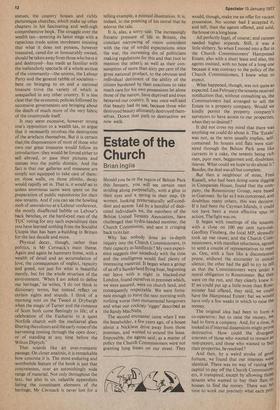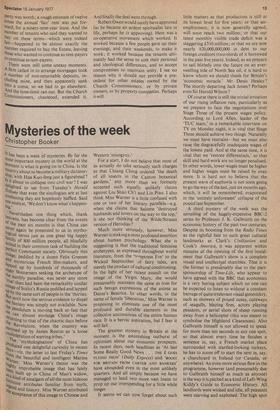Estate of the Church
Brian Inglis
Should you be in the region of Belsize Park this January, you will see certain men striding along purposefully, with a glint in their eyes and a spring in their step. Or women, looking preternaturally self-confident and serene. Led by a handful of dedicated individuals we, the members of the Belsize United Tenants Association, have challenged that hydra-headed monster, the Church Commission, and sent it cringing back to its lair.
Why has nobody done an in-depth inquiry into the Church Commissioners, in their capacity as landlords? My own experience suggests that somebody with the time and the intelligence would find plenty of interesting material. It began when a group of us off a Sunderland flying boat, beginning our leave with a night in blacked-out London, found ourselves in premises which, we were assured, were on church land, and consequently respectable. We were fortunate enough to leave the next morning with nothing worse than monumental hangovers and what our cockney 'rigger' described as the Sandy MacNabs.
The second encounter came when I was the leaseholder, a few years ago, of a house about a Nicklaus drive away from those premises, and wanted to extend the lease. Impossible, the agents said; as a matter of policy the Church Commissioners were not granting long leases on our street. They would, though, make me an offer for vacant possession. No sooner had I accepted it, and left, than the agents offered, and sold, the house on a long lease.
All perfectly legal, of course; and curates needed higher stipends. Still, it was a little slithery. So when I moved into a flat in the Church Commissioners' Hampstead Estate, also with a short lease and also, the agents insisted, with no hope of a long one because it was contrary to the policy of the Church Commissioners, I knew what to expect.
What happened, though, was not quite as expected. Last February the tenants received notification that, without consulting us, the Commissioners had arranged to sell the Estate to a property company. Would we kindly permit the property company's surveyors to have access to our properties, when they so desired ?
It did not cross my mind that there was anything we could do about it. The 'Estate' was not, as the term usually implies, selfcontained. Its houses and flats were scattered through the Belsize Park area like currants in a cake, the tenants being rich men, pqor men, beggarmen and, doubtless, thieves. What could we hope to do about it ? Besides, the deal was all but complete.
But then a neighbour of mine, Fred Russell, who had been doing some digging in Companies House, found that the company, the Rossminster Group, were based in Guernsey. So far as I was concerned, and doubtless many others, this was decisive. If it had been the Cayman Islands, it could not have been a more effective spur to action. The fight was on.
It began with meetings of the tenants, with a close on 100 per cent turn-out. Geoffrey Finsberg, the local MP, shrewdlY took up our cause; and the Church Commissioners, with manifest reluctance, agreed to send a couple of representatives to meet us. One, with a face like a discontented prune, endured the encounter in stoical silence; the other had the gall to try to tell us that the Commissioners were under a moral obligation to Rossminster. But theY were on the run, and they clearly knew it. If we could put up a little more than Rossminster had offered, they said, we could have the Hampstead Estate; but we would have only a few weeks in which to raise the money.
The original idea had been to form a co-operative; but to raise the money, We had to form a company. And, for a time, it looked as if internal dissensions might prove destructive. How could the divergent interests of those who wanted to remain as rent-payers, and those who wanted to buY their properties, be resolved ? And then, by a weird stroke of good fortune, we found that our interests were identical. There was no way of raising the capital to pay off the Church Commission' ers, it transpired, except by allowing those tenants who wanted to buy their flats or houses to find the money. There was o° time to work out precisely what each pro
Perty was worth; a rough estimate of twelve times the annual 'fair' rent was put forward, for a ninety-nine-year lease. And the number of tenants who said they wanted to buY on these terms—which were indeed fair—happened to be almost exactly the number required to buy the Estate, leaving these who wanted to continue as rent-payers to continue as rent-payers.
There were still some uneasy moments. A firm called in to arrange mortgages took a number of non-returnable deposits, including mine, and then apparently sank Into a coma, so we had to go elsewhere. And the time-limit ran out. But the Church Commissioners, chastened, extended it.
And finally the deal went through.
Robert Owen would surely have approved (as he became an ardent spiritualist late in life, perhaps he is approving). Here was a co-operative movement which worked. It worked because a few people gave up their evenings, and their weekends, to make it work; it worked because the tenants ultimately had the sense to sink their personal and ideological differences, and to accept compromises to maintain unity. I see no reason why it should not provide a precedent for other estates owned by the Church Commissioners, or by private owners, or by property companies. Perhaps it will.



































 Previous page
Previous page